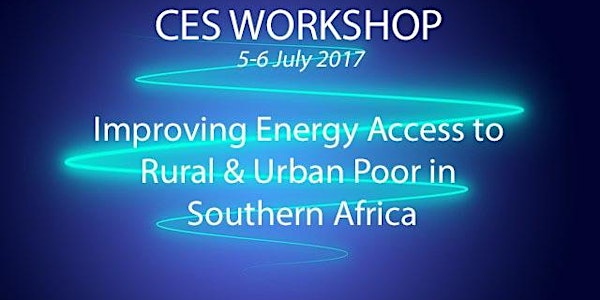
Improving Energy Access to Rural and Urban Poor in Southern Africa
Date and time
Location
The University of Essex
Wivenhoe Park Colchester CO4 3SQ United KingdomDescription
The Centre for Environment and Society at the University of Essex in collaboration with the Environmental Regulatory Research Group at the University of Surrey and the School of Law, University of Lincoln invites paper abstract submissions for their proposed interdisciplinary workshop:
Improving Energy Access to Rural and Urban Poor in Sourthern Africa:
The Role of Law and Legal Policy
Wednesday 5 - Thursday 6 July 2017
Introduction
After decades of energy modernisation projects, Africa continues to have the lowest electrification rate in the world at 26% of households, meaning that nearly 550 million people on the continent are without access to electricity (Africa Partnership Forum, 2007). Access in the Southern African Development Community (SADC) is worse still, at only 24% of the region’s residents. That figure compares with 36% for East Africa and 44% for West Africa.
Although various energy modernisation projects have been undertaken in Southern Africa, these have tended to focus on macro level interventions which concentrate on maintaining supply to industry. Supply for domestic consumption has often been ignored. Limited energy access means the majority of SADC citizens cannot fully enjoy their human rights to health, education, shelter, food and democratic participation. Despite the importance of energy in the realisation of many critical rights, SADC energy policies are often characterised by the absence of inputs from or regarding citizens. These policies also tend to lack a methodology for encouraging and measuring such participation.
But change is underway. SADC countries have signed up to several international efforts to help close the energy gap. Initiatives such as the UN’s Sustainable Energy for All and the region’s own Regional Renewable Energy and Energy Efficiency Strategy and Action Plan, require SADC states to achieve three linked objectives: providing universal access to modern energy services; doubling the share of renewable energy; and doubling the rate of energy efficiency. Achieving these goals will require a massive transition of their energy systems. Law and legal policy will play a central role in managing and delivering such a transformation across different sectors.
The Workshop
This workshop seeks to contribute to research and learning on the law and policy for energy transitions by focusing on the regulatory and institutional challenges in improving energy access to the rural and urban poor in SADC. Although the problem of exclusion is being increasingly recognised, some key questions remain: What are the critical regulatory and institutional considerations? What legal forms are being pursued to ensure policy success, particularly in resource-constrained environments? What regulatory and institutional commonalities are emerging; and what are the prospects for converging these? What are the successful institutional and regulatory design features? What challenges remain in order to achieve these?
The workshop goal is to enable outcome-oriented interaction between experts, innovators, and front-end users of the evolving energy regulatory space and in particular incubate the development of collaborative projects between participants on legal and policy strategies to improve energy access in SADC and other developing countries.
A full programme for this two-day workshop will be announced in due course.
For full details relating to the Call for Papers, please see: http://www.essex.ac.uk/hrc/news_and_seminars/seminarDetail.aspx?e_id=12014
Please register for this workshop by 30 May 2017.